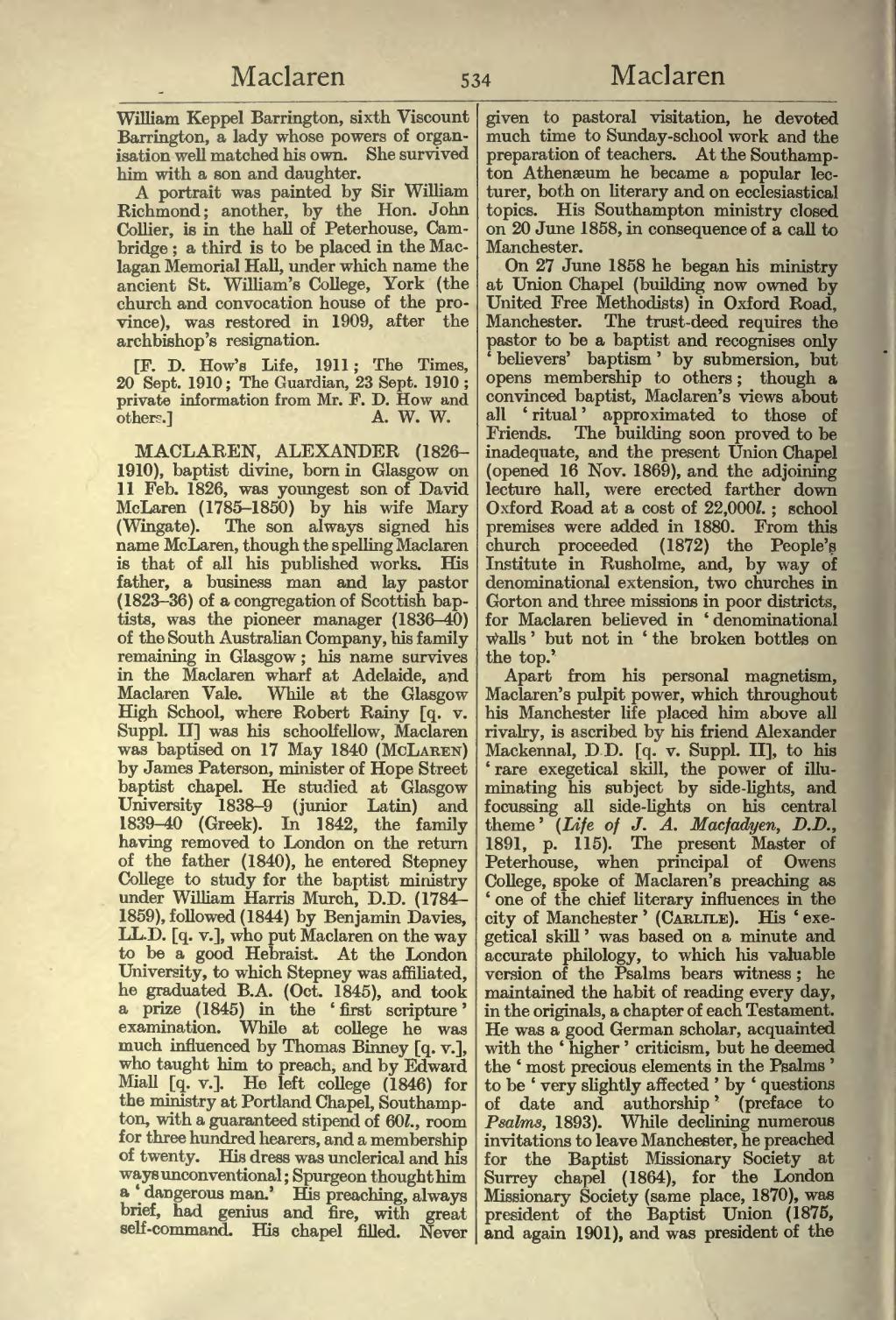William Keppel Barrington, sixth Viscount Barrington, a lady whose powers of organisation well matched his own. She survived him with a son and daughter.
A portrait was painted by Sir William Richmond; another, by the Hon. John Collier, is in the hall of Peterhouse, Cambridge; a third is to be placed in the Maclagan Memorial Hall, under which name the ancient St. William's College, York (the church and convocation house of the province), was restored in 1909, after the archbishop's resignation.
[F. D. How's Life, 1911; The Times, 20 Sept. 1910; The Guardian, 23 Sept. 1910; private information from Mr. F. D. How and others.]
MACLAREN, ALEXANDER (1826–1910), baptist divine, born in Glasgow on 11 Feb. 1826, was youngest son of David McLaren (1785–1850) by his wife Mary (Wingate). The son always signed his name McLaren, though the spelling Maclaren is that of all his published works. His father, a business man and lay pastor (1823-36) of a congregation of Scottish baptists, was the pioneer manager (1836-40) of the South Australian Company, his family remaining in Glasgow; his name survives in the Maclaren wharf at Adelaide, and Maclaren Vale. While at the Glasgow High School, where Robert Rainy [q. v. Suppl. II] was his schoolfellow, Maclaren was baptised on 17 May 1840 (McLaren) by James Paterson, minister of Hope Street baptist chapel. He studied at Glasgow University 1838-9 (junior Latin) and 1839-40 (Greek). In 1842, the family having removed to London on the return of the father (1840), he entered Stepney College to study for the baptist ministry under William Harris Murch, D.D. (1784–1859), followed (1844) by Benjamin Davies, LL.D. [q. v.], who put Maclaren on the way to be a good Hebraist. At the London University, to which Stepney was affiliated, he graduated B.A. (Oct. 1845), and took a prize (1845) in the 'first scripture' examination. While at college he was much influenced by Thomas Binney [q. v.], who taught him to preach, and by Edward Miall [q. v.]. He left college (1846) for the ministry at Portland Chapel, Southampton, with a guaranteed stipend of 60l, room for three hundred hearers, and a membership of twenty. His dress was unclerical and his ways unconventional; Spurgeon thought him a 'dangerous man.' His preaching, always brief, had genius and fire, with great self-command. His chapel filled. Never given to pastoral visitation, he devoted much time to Sunday-school work and the preparation of teachers. At the Southampton Athenæum he became a popular lecturer, both on literary and on ecclesiastical topics. His Southampton ministry closed on 20 June 1858, in consequence of a call to Manchester.
On 27 June 1858 he began his ministry at Union Chapel (building now owned by United Free Methodists) in Oxford Road, Manchester. The trust-deed requires the pastor to be a baptist and recognises only 'believers' baptism' by submersion, but opens membership to others; though a convinced baptist, Maclaren's views about all 'ritual' approximated to those of Friends. The building soon proved to be inadequate, and the present Union Chapel (opened 16 Nov. 1869), and the adjoining lecture hall, were erected farther down Oxford Road at a cost of 22,000l.; school premises were added in 1880. From this church proceeded (1872) the People's Institute in Rusholme, and, by way of denominational extension, two churches in Gorton and three missions in poor districts, for Maclaren believed in 'denominational walls ' but not in 'the broken bottles on the top.'
Apart from his personal magnetism, Maclaren's pulpit power, which throughout his Manchester life placed him above all rivalry, is ascribed by his friend Alexander Mackennal, D D. [q. v. Suppl. II], to his 'rare exegetical skill, the power of illuminating his subject by side-lights, and focussing all side-lights on his central theme' (Life of J. A. Macfadyen, D.D., 1891, p. 115). The present Master of Peterhouse, when principal of Owens College, spoke of Maclaren's preaching as 'one of the chief hterary influences in the city of Manchester' (Carlyle). His 'exegetical skill' was based on a minute and accurate philology, to which his valuable version of the Psalms bears witness; he maintained the habit of reading every day, in the originals, a chapter of each Testament. He was a good German scholar, acquainted with the 'higher' criticism, but he deemed the 'most precious elements in the Psalms' to be 'very slightly affected' by 'questions of date and authorship' (preface to Psalms, 1893). While declining numerous invitations to leave Manchester, he preached for the Baptist Missionary Society at Surrey chapel (1864), for the London Missionary Society (same place, 1870), was president of the Baptist Union (1876, and again 1901), and was president of the
